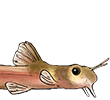Keeping plecos with Syno Lucipinnis?
Keeping plecos with Syno Lucipinnis?
I was just wondering if anyone had kept plecos with Syno Lucipinnis? My local fish store has some synos but I don't know if I should put them in with my leapord frog 134. I have a 50 gallon aquarium but I fear since my pleco is stationary most of the time the syno's might eat him alive.
- Birger
- Expert
- Posts: 3870
- Joined: 01 Dec 2003, 05:04
- My articles: 10
- My images: 112
- My cats species list: 49 (i:43, k:0)
- Spotted: 35
- Location 1: Edmonton,Alberta
- Location 2: Canada
Re: Keeping plecos with Syno Lucipinnis?
I would not think this would be a very good combination...Even though they both would survive in average water conditions they would prefer different ends of the scale. For the L134 softer with lower ph. The syno would prefer harder with a high ph.
One thing that the syno would not like is the higher temperatures that the L134 do well in.
Another thing is the more active syno's may outcompete the pleco for some of it's food.
 but really you would be hard pressed to find a better community fish if combined with suitable tankmates in the right conditions.
but really you would be hard pressed to find a better community fish if combined with suitable tankmates in the right conditions.
Birger
One thing that the syno would not like is the higher temperatures that the L134 do well in.
Another thing is the more active syno's may outcompete the pleco for some of it's food.
You make syno's sound so evilI have a 50 gallon aquarium but I fear since my pl*co is stationary most of the time the syno's might eat him alive.
Birger
Birger
- MatsP
- Posts: 21038
- Joined: 06 Oct 2004, 13:58
- My articles: 4
- My images: 28
- My cats species list: 117 (i:33, k:0)
- My aquaria list: 10 (i:8)
- My BLogs: 4 (i:0, p:164)
- Spotted: 187
- Location 1: North of Cambridge
- Location 2: England.
Re: Keeping plecos with Syno Lucipinnis?
I agree with Birger on all accounts:
1. Nearly all plecos like a softer/lower pH water than Tanganyikan lake Synos. Not saying they couldn't survive together.
Lake Tanganyika has been measured to have a conductivity of over 600 uS/cm, and a pH of 8.5-9 - this is definitely much higher values than ANY wild pleco would ever encounter, including those that live in "hard alkaline" environments in South America.
2. Synos do not eat plecos - and plecos aren't stupid enough to sit still if someone tries to eat them anyways - they just sit still to hide to prevent predators from spotting them.
I keep , which is a riverine Syno in my RIO400 tank- meaning it likes soft and acidic water, rather than the liquid concrete that Lake Tanganyika has.
My biggest S. decora is about 7-8" long, and I have small bristlenoses and corydoras under 1" total length - they have been in the same tank for months - and the small fish are still there. Sure, the reason that I don't have the whole tank FULL of little bristlenoses and corys is that the fry (or in the case of the corys, the eggs) get eaten before they are seen by me.
--
Mats
1. Nearly all plecos like a softer/lower pH water than Tanganyikan lake Synos. Not saying they couldn't survive together.
Lake Tanganyika has been measured to have a conductivity of over 600 uS/cm, and a pH of 8.5-9 - this is definitely much higher values than ANY wild pleco would ever encounter, including those that live in "hard alkaline" environments in South America.
2. Synos do not eat plecos - and plecos aren't stupid enough to sit still if someone tries to eat them anyways - they just sit still to hide to prevent predators from spotting them.
I keep , which is a riverine Syno in my RIO400 tank- meaning it likes soft and acidic water, rather than the liquid concrete that Lake Tanganyika has.
My biggest S. decora is about 7-8" long, and I have small bristlenoses and corydoras under 1" total length - they have been in the same tank for months - and the small fish are still there. Sure, the reason that I don't have the whole tank FULL of little bristlenoses and corys is that the fry (or in the case of the corys, the eggs) get eaten before they are seen by me.
--
Mats





